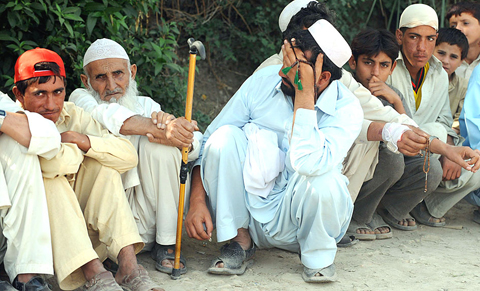Pakistan’s military promised yesterday to target the Taliban leadership in a ground and air offensive launched against the Taliban in South Waziristan, which it said had killed 78 militants so far.
“The last 24 hours, reportedly 18 terrorists have been killed in various incidents and security forces losses are two soldiers and 12 injured,” Major General Athar Abbas told the first news conference on the operation.
He said nine soldiers and 78 militants had been killed since the operation began early on Saturday.

PHOTO: AFP
The figures were impossible to confirm with the battleground sealed off to journalists and all communications in the area shut down.
Ground forces have massed on the western, eastern and northwestern outskirts of Kotkai, the hometown of Tehreek-e-Taliban Pakistan (TTP) chief Hakimullah Mehsud and key Taliban leader Qari Hussain, readying for an assault.
“The high-level targets are the leadership. We hope to get the leadership,” said Abbas, the army’s chief spokesman. “The forces have taken over the heights, features around Kotkai. Kotkai is the hometown of Qari Hussain, formerly known as the mentor of suicide bombs.”
Commanders have been drawing up battle plans for months for what is likely to prove the army’s toughest challenge to date in its war against Islamist militants in the region.
“We wanted to muster our strength, get our resources together. We are an army that does not have unlimited resources,” Abbas said. “We were waiting to have sufficient resources available to start the operation.”
Concerns, however, are mounting that the assault will spark another refugee crisis ahead of heavy snow in a bitterly cold winter.
US officials consulted Pakistan’s civilian and military leaders as troops advanced toward Taliban bastions, heavily mined roads forcing armored convoys to move painstakingly slowly, a military official said.
The insurgents have mined roads with improvised explosive devices (IEDs) of the type deployed to devastating effect against NATO and US troops in Afghanistan, the official said, adding that the Taliban could be luring troops in.
“Resistance is not stiff, but the major problem is the presence of IEDs. We have to send soldiers by foot to clear the IEDs for troops to advance,” he said.
Troops were moving with their flanks protected to prevent the kind of attacks on exposed formations that have caused heavy army losses in past operations, the official said.
Pakistani Prime Minister Yusuf Raza Gilani urged the international community to provide financial assistance for relief and reconstruction at talks with US General David Petraeus yesterday, his office said.
Some of the 100,000 people who have fled to Dera Ismail Khan, on foot and stuffed into pick-up trucks weighed down with bedding and animals, spoke of intensifying fighting and air strikes targeting villages.
“I decided to leave when my neighbor’s house was destroyed by jet fighters,” said Rahim Dad Mehsud, a laborer from Tiarza who said he walked three days to leave South Waziristan with 12 relatives.
Also See: Kabul must prove itself, US says

MORE VISITORS: The Tourism Administration said that it is seeing positive prospects in its efforts to expand the tourism market in North America and Europe Taiwan has been ranked as the cheapest place in the world to travel to this year, based on a list recommended by NerdWallet. The San Francisco-based personal finance company said that Taiwan topped the list of 16 nations it chose for budget travelers because US tourists do not need visas and travelers can easily have a good meal for less than US$10. A bus ride in Taipei costs just under US$0.50, while subway rides start at US$0.60, the firm said, adding that public transportation in Taiwan is easy to navigate. The firm also called Taiwan a “food lover’s paradise,” citing inexpensive breakfast stalls

TRADE: A mandatory declaration of origin for manufactured goods bound for the US is to take effect on May 7 to block China from exploiting Taiwan’s trade channels All products manufactured in Taiwan and exported to the US must include a signed declaration of origin starting on May 7, the Bureau of Foreign Trade announced yesterday. US President Donald Trump on April 2 imposed a 32 percent tariff on imports from Taiwan, but one week later announced a 90-day pause on its implementation. However, a universal 10 percent tariff was immediately applied to most imports from around the world. On April 12, the Trump administration further exempted computers, smartphones and semiconductors from the new tariffs. In response, President William Lai’s (賴清德) administration has introduced a series of countermeasures to support affected

CROSS-STRAIT: The vast majority of Taiwanese support maintaining the ‘status quo,’ while concern is rising about Beijing’s influence operations More than eight out of 10 Taiwanese reject Beijing’s “one country, two systems” framework for cross-strait relations, according to a survey released by the Mainland Affairs Council (MAC) on Thursday. The MAC’s latest quarterly survey found that 84.4 percent of respondents opposed Beijing’s “one country, two systems” formula for handling cross-strait relations — a figure consistent with past polling. Over the past three years, opposition to the framework has remained high, ranging from a low of 83.6 percent in April 2023 to a peak of 89.6 percent in April last year. In the most recent poll, 82.5 percent also rejected China’s

PLUGGING HOLES: The amendments would bring the legislation in line with systems found in other countries such as Japan and the US, Legislator Chen Kuan-ting said Democratic Progressive Party (DPP) Legislator Chen Kuan-ting (陳冠廷) has proposed amending national security legislation amid a spate of espionage cases. Potential gaps in security vetting procedures for personnel with access to sensitive information prompted him to propose the amendments, which would introduce changes to Article 14 of the Classified National Security Information Protection Act (國家機密保護法), Chen said yesterday. The proposal, which aims to enhance interagency vetting procedures and reduce the risk of classified information leaks, would establish a comprehensive security clearance system in Taiwan, he said. The amendment would require character and loyalty checks for civil servants and intelligence personnel prior to